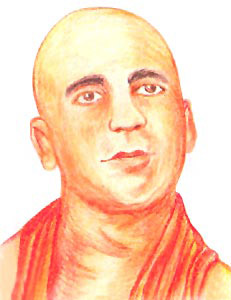 Among the very few great Vedantic scholars that India has so far, the name of Swami Ram Tirth, is definitely one of the most notable ones. He was born on 22nd October 1873 at Murli, Gujaranwala (now in Pakistan) and his father`s name was Pandit Hinachant, who was extremely poor. He studied and mastered the languages like Urdu, Persian and Sanskrit and he also stood first in the B.A. However, he refused to appear for the I.C.S. examination, as he was already inclined towards spiritualism by that time and he got attracted towards the Himalaya and set out to travel there, at a later period.
Among the very few great Vedantic scholars that India has so far, the name of Swami Ram Tirth, is definitely one of the most notable ones. He was born on 22nd October 1873 at Murli, Gujaranwala (now in Pakistan) and his father`s name was Pandit Hinachant, who was extremely poor. He studied and mastered the languages like Urdu, Persian and Sanskrit and he also stood first in the B.A. However, he refused to appear for the I.C.S. examination, as he was already inclined towards spiritualism by that time and he got attracted towards the Himalaya and set out to travel there, at a later period.
In his childhood, Swami Ram Tirth made Father Scott, spellbound with his extraordinary knowledge and he was drawn towards spiritualism just after finishing his traditional education. He also announced renunciation at a very young age and then became famous all over the world in the year, 1901. He went on for a world tour after that and went to Japan in the year 1902 and enthralled the public there with his wonderful way of preaching.
Swami Ram Tirth had the credit of lighting the lamp of Indian spiritualism in the United States of America also and he impressed numerous people during his travels, all over the world. The Egyptian people also honoured him and Swami Ram Tirth emphasized on individual and national independence, throughout his life. He was a great scout for the young people and he attained `Samadhi` on 17th October 1906.




















